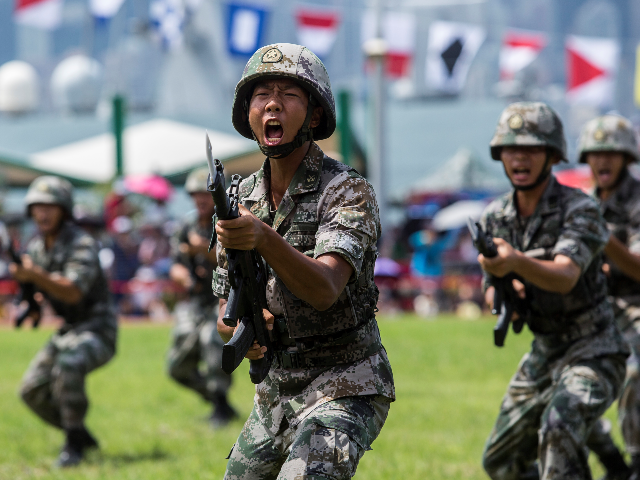A Chinese artillery brigade “mobilized” from Tibet to Xinjiang province, where China has brutally oppressed the Uighur Muslims, to hold a live-fire combat exercise over the weekend.
According to China’s state-run Global Times and China Central Television (CCTV), it took the artillery brigade over ten days to journey from the Tibet Autonomous Region to Xinjiang in northwestern China. The visiting unit served as the “red team” and staged a mock attack on the defending forces stationed in Xinjiang. The reports stated:
Thousands of PLA soldiers and officers from Tibet then scattered across an area of tens of square kilometers, together with various types of combat vehicles. Upon receiving their orders, they rapidly formed up and mobilized toward the targeted area, using the night as cover, CCTV reported.
They were soon met with attacks from the blue team, who deployed special operation units for harassment attacks, launched chemical strikes and used drones for reconnaissance, the report said.
Facing electronic jamming from the blue team, the red team used the BeiDou Navigation Satellite System and vehicle-borne frequency modulation radio stations to reestablish communication and restored command over the troops.
In the coming days, the two teams will conduct more exercises, including intelligence reconnaissance, infiltration, combat planning and long-range artillery strikes, CCTV reported.
Chinese military analysts said the goal of the exercise was to give both the Tibet and Xinjiang units experience at fighting border battles, improving their ability to “safeguard the country’s sovereignty and territorial integrity.”
China has a history of using military drills as cover for shifting personnel and equipment to new permanent deployments. Such tactics were employed in 2017 to cover a significant movement of People’s Liberation Army (PLA) forces into Tibet along the border with India.
A live-fire combat exercise similar to the one held in Xinjiang this weekend was staged to send a warning message to India. PLA troops in Xinjiang periodically hold massive military exercises to signal China’s ability to project force into the disputed Kashmir region between India and Pakistan.
The PLA also wants the locals in Xinjiang to know it has a massive presence in the region and can bring more troops in quickly if needed. A Global Times op-ed on Sunday gave the Chinese security apparatus a hearty pat on the back for doing a terrific job of keeping the peace in Xinjiang, where a million residents have been marched into re-education camps and taught to replace their problematic Islamic religion with Chinese Communist Party doctrine. According to the op-ed:
The current peace in the region has not occurred independently. People of all ethnic groups, police officers and officials at all levels in Xinjiang have made their own contributions to safeguarding the region’s stability.
Police officers in Xinjiang work on the frontline of the fight against terrorism. According to data from China’s Central Television, from 2013 to 2016 a total of 127 police officers in Xinjiang sacrificed their lives in the line of duty.
The article went on to quote some police officers who worked the Xinjiang beat and testified that the province has been swiftly transformed from a hotbed of “terrorism and extremism,” with cities so violent that one Chinese cop did not notice he had been stabbed during a riot, to a placid land of jovial food fairs where “illegal imams” can no longer whip up crowds of terrorists armed with “hacking knives.”
Beijing has rebuffed human rights concerns about its treatment of the Uighur Muslims by insisting it was necessary to imprison, re-educate, and monitor them on a scale never before seen in history to defeat terrorism.
Chinese forces in Xinjiang are currently scrambling to prevent foreign journalists from getting a good look at the re-education camps. The Hong Kong Free Press (HKFP) on Sunday told the amusing story of Chinese operatives staging a car crash to block a road leading to one of the camps, unaware that the foreign journalists they were attempting to obstruct had already passed the intersection and watched the phony accident unfold through their rear-view mirrors.
Other blocking attempts with fake construction work and mysterious police roadblocks have been more successful.
“When AFP reporters tried to approach one internment camp in Hotan, roads were roped off within seconds after an unmarked car that had been following them sped ahead,” the HKFP recalled “In the end, the only option was to photograph the camp – a fenced off compound surrounded by a swath of sand and desert scrub – from afar.”
The Chinese ambassador to Britain on Sunday denied a BBC report that Muslim children in Xinjiang are being herded into hastily-constructed “boarding schools” after one or both parents are shipped off to the re-education camps.
“There’s no separation of children from their parents. Not at all. If you have people who have lost their children, give me names and we’ll try to locate them,” Ambassador Liu Xiaoming told the BBC.

COMMENTS
Please let us know if you're having issues with commenting.